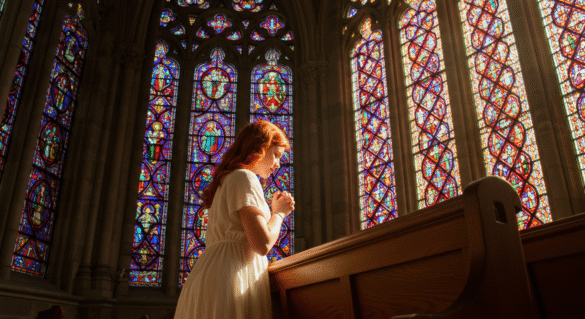Saying you’re Catholic is quite common around the world. But what does it really mean to be Catholic? Is it enough to have been baptized? Is it enough to declare ourselves Catholic on a document or social media? Or is there something deeper, more demanding, and at the same time more liberating in this identity?
The answer lies in a truth that speaks to every heart: to follow Jesus Christ authentically and obediently in the way He Himself established and taught through His Church.
Not Catholic in name only, but in heart and life
Our Lord was clear: “Not everyone who says to me, ‘Lord, Lord,’ will enter the Kingdom of Heaven, but only the one who does the will of my Father in Heaven” (Mt 7:21). That should challenge us: do our words match our actions?
Being Catholic isn’t just a cultural label. It’s a way of life that requires ongoing conversion. It means recognizing that we’re not perfect but are on a journey, always ready to correct our path when needed.
- Saying I’m Catholic but skipping Sunday Mass, which is a precept of the Church, is contradictory.
- Saying I’m Catholic but ignoring the Ten Commandments, is a rootless faith.
- Saying I’m Catholic but receiving Communion without confession while in mortal sin, is to disrespect the Body of Christ.
- Saying I’m Catholic but harboring contempt or indifference toward others, is to deny the Gospel through our actions.
The origin and deep meaning of “Catholic”
If a young person in a crisis of faith hears from evangelicals that the word “Catholic” is not in the Bible, that’s concerning. When we read Matthew 28:18–20, we see something precious: “All authority in heaven and on earth has been given to me. Go, therefore, and make disciples of all nations… teaching them to observe all things… I am with you always…” In Greek, “all” is kathólon—the root of the word Catholic, meaning universal, full.
To be Catholic is to believe in all the truth, to live the fullness of the faith, and to proclaim the Gospel to all nations, through the complete means of salvation given by Christ. That’s why, from the earliest centuries, “Catholic” meant “fully Christian“.
Authentic Catholic identity is revealed in witness
It’s not enough to say it with our lips. Jesus Himself taught that a tree is known by its fruit (cf. Mt 12:33). In other words: our actions reveal the truth of our hearts.
Often, the most powerful witness is the silent one lived out in everyday life:
- attending Mass faithfully even when tired,
- striving to live with purity and integrity,
- the act of forgiveness when everything inside us cries out for resentment or revenge,
- concrete love shown to the poor, the forgotten, the outcast.
As St. Francis of Assisi once said: “Preach the Gospel at all times. If necessary, use words.” This doesn’t mean we shouldn’t speak about Christ—but that our actions should speak first, and speak clearly.
To be Catholic is to be part of the Body of Christ
Being Catholic means being a living member of the Church founded by Christ. That includes:
- Living the sacraments, which are channels of grace—not mere traditions.
- Going to confession regularly, preparing our hearts for the Eucharist.
- Learning and living the Church’s teachings, with love for the truth revealed by God.
- Putting the Gospel into action, even when it costs us.
Even though our priests and bishops are sinners like the rest of us, it is through them that Christ extends His wounded hand and says: “I absolve you from your sins.” It is in the Church that we hear Jesus once again say: “This is my Body… This is my Blood”—not symbolically, but truly and substantially. Here, the Risen Christ has acted invisibly for 2,000 years, pouring out the graces of the Cross.
The sacraments aren’t just symbols or customs of the Church. They are the concrete ways by which God, in His mercy, pours out His grace upon us. Jesus Himself instituted them as sure channels of salvation. Yes, God can act outside of these means, especially in extraordinary cases, but He chose the sacraments to be the ordinary, daily path by which we are sanctified. And throughout history, it is through the sacraments that most souls have found the road to conversion and eternal life.
The Catechism of the Catholic Church reminds us: “The way of Christ leads to life; a contrary way leads to destruction” (cf. CCC 1696). That call is demanding—but deeply liberating, because it draws us into God’s own life.
A life that speaks for itself
You’ve probably met people who don’t preach with words, but with the testimony of a truly Christian life. People who silently carry heavy crosses with hidden joy; who don’t judge, but welcome; who live humility and charity in every gesture.
Such people leave a deep impact. They show us that to be Catholic is to reflect Christ in the world.
The Lord invites us to examine our walk. Are we living what we profess? Do our actions confirm or deny our faith?
The good news is that, even in our inconsistencies, God offers us the chance to begin again. As long as we still have time, we can return to confession, renew our commitment, and make our lives a true witness. But we do not know how long this gift will be offered — let us embrace it today, while it is still within our reach. — so let us not delay the grace of conversion.
If this message spoke to your heart, share it with someone who’s also seeking to live their faith more truthfully.
Last reviewed: May 12, 2025


